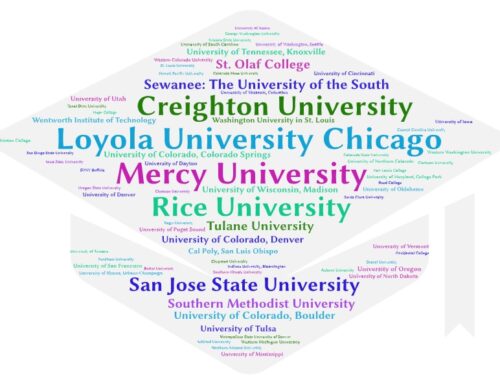One of the first questions people ask every college student is, “What’s your major?” Some students know from a very young age that they want to pursue marine biology or English literature or aerospace engineering. But most students have several competing interests or they may have no idea what they want to study.
I recently attended a webinar from the College Essay Guy that confirmed many of the strategies we use at Discovery College Consulting to help students find a major that is a great fit. The webinar also provided some important information for students considering high-demand majors.
Often, high-demand fields such as nursing, engineering, computer science, business, biology, psychology and journalism are impacted. This means there are more qualified applicants than space available. Consequently, applicants to these majors may need a higher GPA and/or test scores than they would for majors that aren’t impacted. According to Jessica McGregor, Director of Administration at CU Boulder’s Leeds School of Business, Leeds has “more applicants with a 4.0 than they have room to admit.”
If you’ve decided to pursue one of these high-demand majors, you might want to consider adjacent fields. You can often accomplish the same long term goals with a slightly different degree. Instead of:
- Business – consider economics, data science or communications.
- Biology – choose biochemistry, public health or humanities. (Remember, you can major in anything and still go to meical school.)
- Computer science – consider information systems, cognitive science, statistics or data science.
- Psychology – choose neuroscience, sociology or human development.
Some students have wondered if it makes sense to “game the system”. For example, a student might apply as a philosophy major, all the while intending to transfer to the college’s mechanical engineering program once they get on campus. This usually backfires. If a student is unable to get into engineering at the outset, they probably won’t be able to get in later. As well, if your application doesn’t show any interest in philosophy, admissions officers will question your “fit to major” and rightly wonder if you’re lying about your interest in the field. It is paramount to be truthful during the application process.
Fit to major is an important consideration, especially for high-demand majors at highly selective colleges. Admissions counselors will factor in not just your grades and test scores, but also:
- Academic preparation – have you taken advantage of all of the opportunities at your high school to prepare for studying this subject?
- Extracurricular alignment – do your activities align with your academic interests?
- Understanding the field – can you demonstrate a basic level of knowledge in your chosen major?
- Future goals – have you expressed interest in working in your chosen field over the long term?
If you can’t answer yes to the questions above, your intended major may not be a good fit.
Once you’ve selected a major, where you choose to earn your degree matters as well. Return on investment (ROI) has become a growing concern for college students and their parents. College is a huge financial investment, second only to the purchase of a home, for most families. Parents especially want to make sure the major their student chooses will set them up for a secure financial future and many believe a career in STEM (Science, Technology, Engineering and Math) or business is the only way to do so. But, keep in mind ROI isn’t just about your starting salary. Studies show that liberal arts majors often catch up to STEM majors in terms of earnings within just ten years of graduation. It’s important to consider career satisfaction as well as lifetime earnings potential.
And, while attending an Ivy League college may seem like the best way to ensure career success, public flagship universities may be a better bet than elite private colleges when it comes to ROI. According to the Georgetown University Center of Education and the Workforce, graduates of public flagships will have an ROI of $148,000 ten years after graduating, whereas alumni of elite private colleges will only see $135,000 after ten years. Only graduates of Ivies will have out-earned public flagship grads.
One final caveat: it’s okay to be undecided. Many colleges and universities offer special programs for students who don’t yet know what they want to study. Often called Exploratory Studies, these programs expose students to a wide variety of majors. Campus advisors work with students to help them find their area of interest and declare a major no later than the end of their sophomore year. And, don’t worry parents — even if your student participates in this type of program, they should still be able to graduate in four years.






